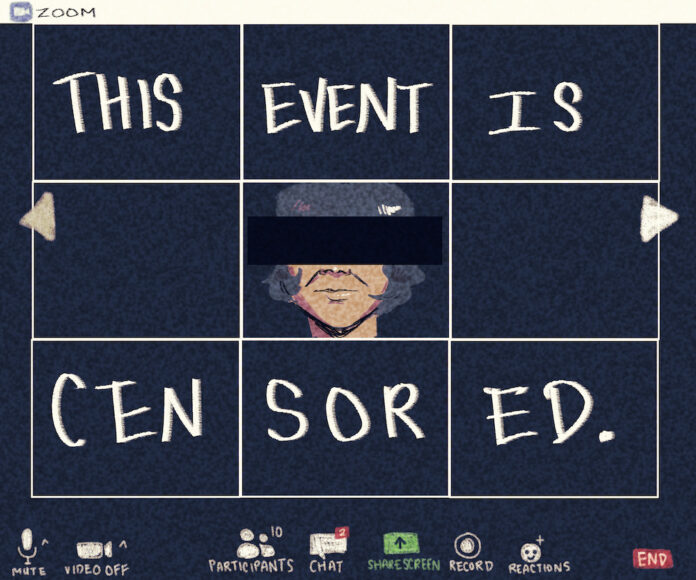A group of faculty members sent a letter on behalf of the college Nov. 23 expressing discontent with the actions of the video communications platform Zoom following the company’s cancellation of an academic conference organized by San Francisco State University Sept. 23.
The letter raised concerns about potential censorship on academic expression and was signed by the Dean of the College and Vice President of Academic Affairs Wendy Sternberg, Chief Information Officer (CFO) and Vice President for Information Technology Service (ITS) James Uhrich and professor and president of faculty council John Lang. The letter urged Zoom founder Eric Yuan to stop canceling academic events on the platform and to uphold uncensored discourse on its servers. According to Uhrich, the issue impacts academic expression at Occidental and other academic institutions across the country.
“It’s a serious issue for us, as it should be for every single academic institution out there,” Uhrich said. “If we are in a position where a platform can make decisions impacting academic freedom, that is a direct assault on our fundamental mission and what we are all here to support on a regular basis.”
The letter from Occidental’s faculty was written in response to the cancellation of an event organized by San Francisco State University (SFSU) titled “Whose Narratives? Gender, Justice, Resistance: A Conversation with Leila Khaled,” featuring Leila Khaled, a well-known Palestinian activist. Other events coordinated in solidarity with SFSU or to discuss online censorship — such as those hosted by the American Association of University Professors (AAUP) branch at New York University (NYU), the University of Hawai’i at Manoa and the University of Leeds in the United Kingdom — were shut down as well.
Khaled is a member of the Popular Front for the Liberation of Palestine and famed for her involvement in the hijacking of two planes in 1969 and 1970. According to an article published by The Intercept, the event was canceled after the Lawfare Project — a pro-Israel legacy group — reached out to Zoom and warned them that Khaled’s event might be in breach of federal anti-terrorism laws. The Lawfare Project also contacted executives at Google, Facebook and Youtube and successfully shut down Khaled’s events on those sites as well, according to the statement published on their website.
English professor Warren Montag said he thinks the cancellation of the event represents larger threats of censorship in the media and the silencing of suppressed political groups — Palestinians in particular.
“Zoom should stay out of the business of censorship,” Montag said. “I’m Jewish myself … and you can’t allow non-academic groups with a very clear political agenda, right-wing political agenda, to exempt Israel from criticism.”
In a letter to the campus community, SFSU President Lynn Mahoney said the panel did not violate any laws concerning terrorist activity or Zoom’s conduct policy. In a letter to NYU President Alexander Hamilton, AAUP President Irene Mulvey and Henry Reichman — chair of the AAUP’s Committee on Academic Freedom and Tenure — urged Hamilton to take a strong stance against Zoom’s policy after the organization’s own Oct. 23 event was shut down. Mulvey and Reichman wrote that Khaled’s speech should be protected by law as her event did not perpetuate terrorism or violence.
“The American Association of University Professors is deeply concerned about the implications for academic freedom of the unilateral decision by Zoom to cancel a webinar hosted by the NYU chapter of the AAUP,” Mulvey and Reichman wrote. “It is, of course, both ironic and sad that the event was organized to protest Zoom’s previous censorship of a webinar at San Francisco State University.”
Anthony Chase, sociology professor, said in an email that he believes Zoom, a private corporation, should not have the power to determine what is acceptable academic speech.
“Our communications software should not be in the position of deciding what content is acceptable, what participants are acceptable, what politics are acceptable,” Chase said via email. “This would suppress the free speech essential to challenging both status quo ideas and embedded power structures.”
In the wake of the cancellation, Sternberg and Uhrich said they reviewed other platforms such as BlueJeans and Cisco Webex to host Occidental’s classes in the spring semester, but found that most online video-hosting platforms, much like Zoom, include terms of service clauses that allow for control of content streamed on their services. Lang said the college will support anyone who chooses not to use Zoom, but he continues to use the platform for his classes and meetings. According to Lang, Zoom has a set of features that allows for widespread and accessible instruction, making it hard to discontinue using their platform.
“Now that we’re hosting the number of sessions that we do every day, there are 225 classes taught per day on campus, there are four to five Zoom sessions held every day, approaching a 1,000 session a day,” Lang said. “They [technology companies] have become embedded in our daily lives.”
Sternberg said she hopes that Occidental’s reliance on outside commercial platforms will become less of an issue in the future as the pandemic improves and students are allowed to return to the college.
“We’re hopeful that this is a temporary situation,” Sternberg said. “I think that before long it becomes less of an issue. We won’t have an opportunity for a commercial entity like Zoom to have a say in what content our students and faculty are engaging in.”
![]()































